Clifford Garstang's Blog, page 113
December 30, 2011
2012: The Year of the Lit Mag
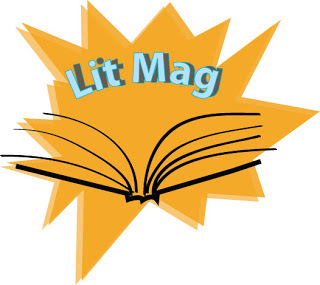 What if we declared 2012 to be the year of the Lit Mag? For years I have been subscribing to a lot of literary magazines. Currently I have many piles of them on the floor in my office, most of them unread. In the last week alone, 5 more have have arrived, so there's a new stack growing on the corner of my desk.
What if we declared 2012 to be the year of the Lit Mag? For years I have been subscribing to a lot of literary magazines. Currently I have many piles of them on the floor in my office, most of them unread. In the last week alone, 5 more have have arrived, so there's a new stack growing on the corner of my desk.This won't necessarily solve the problem of where to put all these magazines, but one of my resolutions for 2012 is to do a better job of reading the magazines that come in. I know the publishers appreciate my subscription, but I think they'd also like me to read the darn things.
So here's what I plan to do. In 2012, you'll be seeing a lot more discussions of literary magazines on this blog. I probably won't be able to do daily posts, but I'll try to do Lit Mag posts a couple of times a week. If you are the editor of a magazine and want me to feature yours, leave a comment or send me an email. If you're an online magazine, I'll try to do the same. Or, if you're a reader of Lit Mags and would like to do a guest blog on a magazine you like, let me know.
Stay tuned for 2012: The Year of the Lit Mag![image error]
Published on December 30, 2011 13:00
Tips for Writers: Get Back to Work!
 'Tis the Season for New Years' Resolutions, and, like a lotof writers, my resolutions touch on my writing goals, although mostly theycircle around writing: reading more/better literature will help refine my own style;reading more literary magazines will help me understand better what thejournals are looking for; staying off the Internet will free up time foreverything else. (I could probably tie in the eating better/exercising moreresolutions, too.)
'Tis the Season for New Years' Resolutions, and, like a lotof writers, my resolutions touch on my writing goals, although mostly theycircle around writing: reading more/better literature will help refine my own style;reading more literary magazines will help me understand better what thejournals are looking for; staying off the Internet will free up time foreverything else. (I could probably tie in the eating better/exercising moreresolutions, too.)It all boils down to discipline. And the search fordiscipline explains my attempts at meditation and my reading on that subject—still waiting for thatto work. But part of my effort to improve discipline involves goal-setting.
I know writers who set daily word-count goals, and I do thatsometimes, such as during a NaNoWrimo push. (My goal for this November was 2500words per day, and I stuck to that for most of the month, easily surpassing theoverall goal of 50,000 words.) When I'm in revision mode, I may set a page-countgoal rather than focusing on the number of words. I did that in August when Iwas at a writing retreat in France, working on the revision to my novelmanuscript: the number of pages I had to get through divided by the number daysavailable. That worked well.
Most of the time, though, I'm floundering. I hate to admitthat, but some days I sit at my desk and I don't know what to write. It's notwriter's block, exactly. It's more fundamental than that. It's not knowing.It's not being ready to move on in the given project. And so on days like that—days like today, forexample—I writesomething else: a blog post, like this one; a book review (I did thatyesterday); ideas for something I might want to write in the future. If I'mreally struggling, I might read something relevant to writing—I just started The Writer's Journey by ChristopherVogler.
But what I don't do is leave my desk, at least not duringthe hours I set aside only for writing. I don't go run errands when I should bewriting. I don't do housework. I don't read magazines or books unless they'rerelated to the work. Or, if I do let my attention wander into other realms, I remind myself, like a student of meditation, to begin again. In other words, even if a word-count goal or a page-countgoal isn't feasible, then my objective is simple: get back to work. And that,basically, is my New Year's Resolution for 2012. [image error]
Published on December 30, 2011 09:55
December 29, 2011
The New Yorker: "Creative Writing" by Etgar Keret
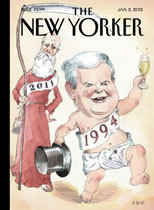 January 2, 2012: "CreativeWriting" by Etgar Keret
January 2, 2012: "CreativeWriting" by Etgar KeretThis is a very short little story that writers, especially,will appreciate. It's about Maya and Aviad, a couple coping with Maya'smiscarriage. Maya takes a creative writing class to give her something to do,and her work is well received by her instructor. She writes three stories, eachof which is possibly a commentary on her own life and relationship with herhusband. Aviad seems to be somewhat jealous of Maya's success with her stories,so he secretly signs up for a beginning course (taught by someone else). In hisfirst class, in a free-writing exercise, he writes a story about a fish. Andthis story also seems to reveal something about Aviad.
Based on the Q&Awith Etgar Keret, we suppose that the stories mostly reveal that both Mayaand Aviad are exploring their feelings toward one another in these stories, butdon't know exactly how they feel. It does seem that Aviad is more certain thanMaya, but then he's only written one story so far.Is that what we do as writers? Explore our own feelingsthrough our characters? Keret says he is all of the characters:
When I write a story, I am all the characters in it. I can'twrite a character I don't feel some emotional identification with, even if itis the hired killer who murders the protagonist's pregnant wife. Since allthose characters exist in my head, they have to be me, in some sense, to have a"real" body in the story world.I don't think that's true for me. Some of my characters certainly mustbe the "other" even if I do try to imagine how they would feel and to empathizewith them.
What about you?[image error]
Published on December 29, 2011 05:30
December 27, 2011
eBook Prices Are Too High
 When Amazon launched the Kindle, we were told that eBookswould be $9.99 for most new releases, with many other books available for less.That was true, for a while. Amazon had set the price and everyone else—publishers,authors, and readers—had to live with it. Considering that new hardcovers sellfor $30 or more in the bookstore (although considerably less on Amazon, ofcourse), the eBook price seemed like a pretty good deal. Pricing has changednow, however, and the publishers, for the most part, set the prices.
When Amazon launched the Kindle, we were told that eBookswould be $9.99 for most new releases, with many other books available for less.That was true, for a while. Amazon had set the price and everyone else—publishers,authors, and readers—had to live with it. Considering that new hardcovers sellfor $30 or more in the bookstore (although considerably less on Amazon, ofcourse), the eBook price seemed like a pretty good deal. Pricing has changednow, however, and the publishers, for the most part, set the prices.eBooks have lots of advantages, of course, all welldocumented: portable, space-saving, searchable. But there are alsodisadvantages. While some books can be lent (to other Kindle owners), manycannot; and of course lending to a non-Kindle or Kindle-app user is out of thequestion. Some of us still like reading actual books, turning actual pages,feeling the paper in our hands. And I happen to like more information aboutwhat's coming—I like to know how far from the end of a chapter I am, or howmany pages there are in the book. I also like being able to go back and readsections over if I'm confused about something. While that's not impossible witha Kindle, it's not as easy as merely flipping pages. And sometimes, when I'mdone with a book, I like to sell it or give it away. Can't do that with aneBook.
But today I'm thinking about prices. I recently had a giftcard to spend on Amazon. There were a couple of new release hardcovers I wasinterested in, so I bought them. The first was Julian Barnes's The Sense of an Ending. It retails for$23.95 (although it's only 175 pages) in hardcover. (Terrific book, by theway.) Amazon sells it for $14.37. The Kindle price is $11.99, a difference of$2.38. I also got The Marriage Plotby Jeffrey Eugenides. Amazon's price is $15.28, with a list price of $28.00. TheKindle price is $12.99, a difference of $2.29. Weighing the costs and benefitsof the eBook, it seems worth it to me to pay a little extra to have thehardcover—especially if there's the theoretical possibility of selling the bookonce I've read it, or giving it away. In fact, I've found many instances wherethe Kindle price for a book is actually higherthan the discounted price of a paperback. (Shipping must be taken intoconsideration, of course, but my purchases usually total over $25, in whichcase shipping is free.)
So, as a reader, I'm not at all happy about eBook prices.
On the other hand, there are many books available for muchless (and I'm not even talking about self-published books, many of which arefree or sell for $.99). For example, my publisher, Press 53, sells most of itseBooks, including mine, for $3.99 on Kindle and Nook. The paperback list pricefor my book is $14.00 and the Amazon/B&N discounted price is $12.62. So,the eBook savings over the discounted price is $8.63. That's significant.
All of which is considered solely from the reader's point ofview. As an author, I'm not sure what to think. I want to make more money frombook sales, but at some point the price is too high and inhibits demand, and ina competitive environment that's the last thing I need!
Published on December 27, 2011 09:52
Prime Number Magazine: the latest update
 Prime Decimals 13.7 is live! This update includes work by Rachel Unkefer, Craig Fishbane, Bryan Shawn Wang, Carolyn Moore, and Penelope Scambly Schott.
Prime Decimals 13.7 is live! This update includes work by Rachel Unkefer, Craig Fishbane, Bryan Shawn Wang, Carolyn Moore, and Penelope Scambly Schott.And we are actively reading submissions for Issue 17 and beyond. We need full-length stories and essays up to 4,000 words, flash fiction and nonfiction below 1,000 words, poetry, short drama, craft essays, book reviews, interviews, and cover art (reflecting the prime number of a particular issue). Please check out the submission guidelines for more information.
Published on December 27, 2011 04:50
December 26, 2011
New Yorker Story of the Year: 5 Days Left to Vote
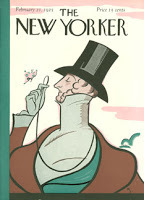 Read all about the Top Ten New Yorker Stories of 2011, and then vote in our poll in the sidebar at right. Voting will close at midnight Saturday, December 31, and the winner will be announced on Sunday, January 1.
Read all about the Top Ten New Yorker Stories of 2011, and then vote in our poll in the sidebar at right. Voting will close at midnight Saturday, December 31, and the winner will be announced on Sunday, January 1.
Published on December 26, 2011 11:54
Guest blogger: Okla Elliott
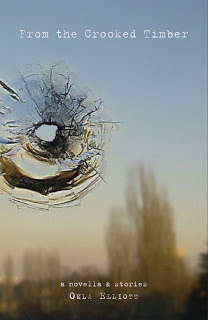
Editor's Note: Okla Elliott's book, From the Crooked Timber, a novella and stories, was recently published by Press 53. I asked him to tell us a little something about the book.Okla Elliott:
I have beenasked to offer a brief and informal discussion of "The Names of DistantGalaxies," the novella in my short fiction collection From the Crooked Timber. First off, let me thank Clifford Garstangfor that generous offer. Mr. Garstang is a first-rate practitioner of the shortfiction form and a champion of literature, so I was honored when he asked me todo this little piece.
"The Names ofDistant Galaxies" started as a novel with chapters alternating between thenarrator as a boy and his stepmother when she was his age, which was when herneurological disorder, dystonia, set in. The chapters which were focused on thenarrator were in first-person and those on his stepmother were in third-, withthe idea being that as an adult he was looking back on it all, remembering hisown childhood and imagining hers. This got a bit too programmatic, and thestyle came to feel too much like a lot of southern/rural novels I'd read. Then,some friends pointed out to me how there was this strain in the novel that soundedlike an outside commentator's voice, but still somehow the voice of thenarrator, just very distant and unnatural. I started writing randomly in thisvoice and realized it was the voice of the narrator trying to figure out how totell his story.
So then I made the not very large leap over to having him do exactlythat—struggle with writing this story he had no idea how to tell. So then therewere these meta-sections, where he would talk about his current life and theprocess of writing (and all the troubles he was having with that process).Those sections are as close to my natural talking voice as I could get withoutlosing artistry, so that the reader feels like this is a conversation, but thenthe sections he writes as part of his novel/memoir are much more "literary"—mypoint being, in a way, that we stylize our stories pretty radically, and eventhe intermediary sections that are meant to be in a raw voice are stylized,just differently, in a way meant to mimic my own natural speech (which is itselfstylized), and so on. In effect, I wanted to have a few kinds of cake and eatthem all. I wanted to write a more traditional literary narrative, and I wantedto mess with the form a bit as well. I have been trying to find a proverbial "thirdway" between so-called traditional and so-called experimental writing for along time, and so I have my narrator write an incomplete novel in thetraditional psychological-realist style, while I wrote a novella that makes useof various meta-techniques. My issue with a lot of "traditional" writing isthat it seems to want to pretend that the 20th century neverhappened in terms of literary innovations, and my issue with "experimental"writing is that it too often misses what I think the point of literature tobe—namely, to understand better what it means to be human. So, as I say, Itried to find a third way and eat all the cake I could get my hands on, as itwere.
This process was less than efficient, in a way. To get what turned out to beabout 80 pages in manuscript form, I wrote over 230 pages and re-envisioned itseveral times. I've loved the novella form for a long time and think it's theperfect genre in many ways—long enough to engage with big stories yet shortenough to read in one day—so I am happy to have dedicated so much energy tothat piece. I plan on writing more novellas and hope to see a kind renaissancein the form, now that so many small presses are getting more interested in themand with the advent of the Kindle/Nook reading technologies.
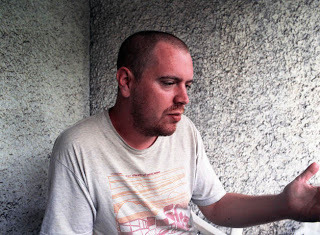 Okla Elliot is currently the Illinois Distinguished Fellow at the University of Illinois, where he works in the fields of comparative literature and trauma studies. He also holds an MFA from Ohio State University. For the academic year 2008-09, he was a visiting assistant professor at Ohio Wesleyan University. His drama, non-fiction, poetry, short fiction, and translations have appeared in Another Chicago Magazine, Indiana Review, The Literary Review, Natural Bridge, New Letters, A Public Space, and The Southeast Review, among others. He is the author of three poetry chapbooks--The Mutable Wheel; Lucid Bodies and Other Poems; and A Vulgar Geography--and he co-edited (with Kyle Minor) The Other Chekhov.
Okla Elliot is currently the Illinois Distinguished Fellow at the University of Illinois, where he works in the fields of comparative literature and trauma studies. He also holds an MFA from Ohio State University. For the academic year 2008-09, he was a visiting assistant professor at Ohio Wesleyan University. His drama, non-fiction, poetry, short fiction, and translations have appeared in Another Chicago Magazine, Indiana Review, The Literary Review, Natural Bridge, New Letters, A Public Space, and The Southeast Review, among others. He is the author of three poetry chapbooks--The Mutable Wheel; Lucid Bodies and Other Poems; and A Vulgar Geography--and he co-edited (with Kyle Minor) The Other Chekhov.
Published on December 26, 2011 05:09
December 25, 2011
Merry Christmas!
 I don't celebrate Christmas, so I don't put up Christmas decorations. I like Christmas trees, though, and I especially like trees like the one pictured--still alive and in the ground. I have a tree like this, but without the ornaments . . .
I don't celebrate Christmas, so I don't put up Christmas decorations. I like Christmas trees, though, and I especially like trees like the one pictured--still alive and in the ground. I have a tree like this, but without the ornaments . . .In fact, one of the fun things about my home is the pine forest out back that is on the march. It's an army of little Christmas trees. When I bought the land 11 years ago, it included two pastures--one at the top of a hill and one at creek-level at the bottom. Since I don't have grazing animals and didn't want to rent the pastures out, I've let them go wild. In the upper pasture, the pine trees have gone crazy, spreading throughout, despite the thick grass. (There's an opposing army of wild cherry trees, especially pretty in spring and fall, and the two armies have recently crossed into the other's territory.) Anyway, there are hundreds of little pine trees (and other varieties of conifers, including juniper), which is exciting to watch transform the property.
While everyone else will start thinking about un-decorating tomorrow, my house will already be back to normal.
But for today, Merry Christmas to you! And Happy Hanukkah and Kwanzaa, too.
Published on December 25, 2011 05:16
December 24, 2011
"The Replacement Wife" in Blackbird
 One of my favorite literary magazines is Blackbird, and so I am especially thrilled to have a story in the Fall 2011 issue. Read "The Replacement Wife" here. The story is the latest from my forthcoming novel in stories to appear. The book,
What the Zhang Boys Know
, will be published by Press 53 in September 2012.
One of my favorite literary magazines is Blackbird, and so I am especially thrilled to have a story in the Fall 2011 issue. Read "The Replacement Wife" here. The story is the latest from my forthcoming novel in stories to appear. The book,
What the Zhang Boys Know
, will be published by Press 53 in September 2012.My story is in great company in this issue: fiction by Belle Boggs, Bryn Chancellor, and others; lots of poetry, including work by Erica Dawson and Nick Lantz; plus reviews, essays, readings, and more. There's even a suggested reading order, which I find amusing because it puts my story last, right before the reviews. But it's a great idea, because there's so much wonderful material here that the list will help you manage it without missing anything!
Thanks for reading!
Published on December 24, 2011 05:00
December 23, 2011
Tips for Writers: Happy Holidays!

Happy Holidays!
No, that's not a secular festive greeting,that's the tip for this Friday, December 23, 2011, Christmas Eve Eve. Althoughthe "happy" part isn't crucial. Miserable Holidays might be even better. Stressful Holidays. Conflicted Holidays.
Have you ever noticed that a lot of short stories focus on aholiday? It's a natural, when you think about it. The holiday is a short periodof time, just right for short fiction. It's an organic reason for people to come together--nothing contrived necessary. They are oftenemotional and stressful. People come into them with high expectations andgenerally a great deal of baggage, and when those expectations are frustrated--look out! People often do some crazy things onholidays. It's a great setup for conflict, and that, after all, is the heart ofthe short story.
So, if you're looking to do a little writing during thislast week of December, try this exercise: Pick a holiday, any holiday. Imaginea family gathering in celebration of the holiday. But one member of the familybrings a guest—an unwelcome guest. Instant conflict! I can imagine countlesspossibilities here. I may even write a story myself.
Have a great holiday![image error]
Published on December 23, 2011 06:21



